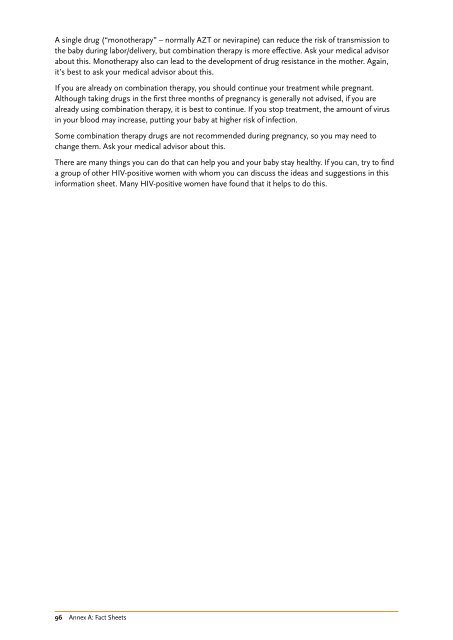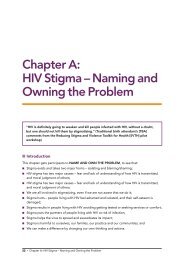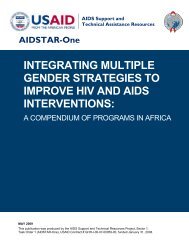Guide for Community Assessments on Women's Health Care - ICRW
Guide for Community Assessments on Women's Health Care - ICRW
Guide for Community Assessments on Women's Health Care - ICRW
You also want an ePaper? Increase the reach of your titles
YUMPU automatically turns print PDFs into web optimized ePapers that Google loves.
A single drug (“m<strong>on</strong>otherapy” – normally AZT or nevirapine) can reduce the risk of transmissi<strong>on</strong> to<br />
the baby during labor/delivery, but combinati<strong>on</strong> therapy is more effective. Ask your medical advisor<br />
about this. M<strong>on</strong>otherapy also can lead to the development of drug resistance in the mother. Again,<br />
it’s best to ask your medical advisor about this.<br />
If you are already <strong>on</strong> combinati<strong>on</strong> therapy, you should c<strong>on</strong>tinue your treatment while pregnant.<br />
Although taking drugs in the first three m<strong>on</strong>ths of pregnancy is generally not advised, if you are<br />
already using combinati<strong>on</strong> therapy, it is best to c<strong>on</strong>tinue. If you stop treatment, the amount of virus<br />
in your blood may increase, putting your baby at higher risk of infecti<strong>on</strong>.<br />
Some combinati<strong>on</strong> therapy drugs are not recommended during pregnancy, so you may need to<br />
change them. Ask your medical advisor about this.<br />
There are many things you can do that can help you and your baby stay healthy. If you can, try to find<br />
a group of other HIV-positive women with whom you can discuss the ideas and suggesti<strong>on</strong>s in this<br />
in<str<strong>on</strong>g>for</str<strong>on</strong>g>mati<strong>on</strong> sheet. Many HIV-positive women have found that it helps to do this.<br />
96 Annex A: Fact Sheets

















